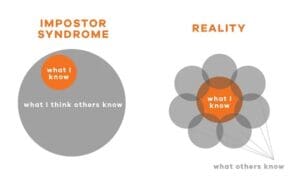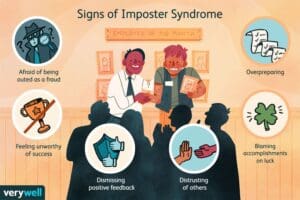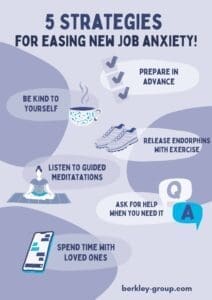How do you deal with imposter syndrome?
Have you ever been in a work environment, educational environment, or social environment, and feel as though you do not deserve to be there or be recognized? So many achieve great accomplishments, and work towards obtaining goals, being unapologetically themselves and feeling confident and proud of who they are and what they achieved. Despite this, and despite where our efforts lead us, sometimes we are left feeling as though we are still not good enough. Read on to learn more about imposter syndrome and an answer to the question, How do I deal with imposter syndrome?
Overview
- What is imposter syndrome?
- Do you have imposter syndrome?
- How do you deal with imposter syndrome?
- Ending imposter syndrome

Infographic courtesy of Shivani Gopal.
What is imposter syndrome?
Imposter syndrome is a term used to describe one’s own self doubt of their abilities, and lack of feeling as though they have earned what they have achieved.
Imposter syndrome is not a recognized mental health disorder.
Many tend to have these feelings come up when they have obtained an accomplishment, but feel as though they are still not worthy or good enough. Handling these feelings can be draining and confusing. It can cause great stress and shame, when one feels as though they do not deserve a situation or result due to their own hard work.
If you are feeling this way, it is important to ask yourself, why? Reflect on the efforts and strides you have made, and try to examine why you feel they are not valid. Maybe you feel as though it was luck that granted you the position you are in now. Possibly, you may feel as though you were handed something out of pity.
Once you identify what it is that may be prompting you to feel as though you are an imposter, further ask yourself, what is underneath that? Sometimes messages we have received throughout our life can become internalized. Sometimes, one bad moment, accompanied by a rough comment, can stick with us forever.

Infographic courtesy of Verywell Health.
Do you have imposter syndrome?
People endure various circumstances that shape and inform them as to who they are and what they are deserving of. When dealing with imposter syndrome, it is important to identify what one feels as though they are an imposter of, why they feel that way, and then what may be creating that response.
For example, if a comment that was made previously may be dawning on you, or maybe a failed attempt of yours from the past, it can be helpful to hone into the here and now. Instead of looking for the reasons as to why we are not good enough, shifting our focus and attention to the aspects that are positive that lead us to our predicaments may help.
It can be encouraging to look for moments in your life that challenge the view you currently have on yourself. Sometimes our negative view on ourselves can cloud the best parts of ourselves. This makes sense, as feelings of doubt, shame, regret, anxiety, sadness and more, tend to stand out and stick with us for some time, given how discomforting these feelings are.
It is important to remind ourselves of the good we produce. We can then rid ourselves of the negative narratives and views we have of ourselves due to past experiences, that may have led us to feel as though we are never good enough or deserving.

Many people experience imposter syndrome when starting a new job. Infographic courtesy of Berkley Group.
How do you deal with imposter syndrome?
Taking the aforementioned steps are easier said than done, and it takes time to recreate your own understanding of who you are and the accomplishments you achieve. Therapy and speaking with a professional to explore how one has come to develop such unachievable standards of themselves may help. But what are helpful steps to challenging these thoughts right now?
Here are four steps you can immediately take to challenge these imposter thoughts:
- Find times in which you achieved something or surprised yourself.
- Look for moments where you told yourself you would not amount to expectations, but did! This could be getting into a college, getting a job you really wanted, making a sports team that you were hoping to make and more!
- Try to write down affirmations each day, even if it is difficult and doesn’t feel genuine at first.
- Make a small goal to tell yourself one thing you are proud of each day. Maybe it was that you did well in something, or it could be that you are proud of where you ended up. If these do not feel genuine, try to at least tell yourself that you are proud of trying your best, and even making the effort to feel settled in who you are and how far you have come.

Ruchika Tulshyan (pictured here) has written about the impacts of imposter syndrome on women in the workplace.
Ending imposter syndrome
Feeling confident and competent can take time, especially when you have been shaped to believe you are not good enough. Though this may feel heavy, and as though you will not break this cycle, with effort, self love, and care, changes can be made.
It is important when in moments in which you may feel as though you are an imposter, to remember that you earned your way into the position. It may not feel that way, and that is okay, but just remember, we are usually the worst critics of ourselves. So even if you feel you don’t belong, or have not earned something that seems like a big achievement, just remember that others do not see it that way, and that they may have seen something in you that you do not see.
Maybe with time, effort and care, you can start to see it too.
About the Author
Lia Pezzato, MFT, is a Pennsylvania & New Jersey Staff Therapist at the Council for Relationships. If you would like to discuss the question, “How do you deal with imposter syndrome?,” or learn about her current availability for accepting new clients, go here.
See our Therapist & Psychiatrist Directory to find a different CFR therapist or psychiatrist near you.

